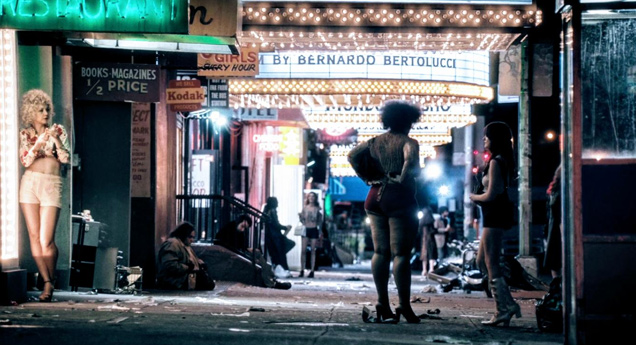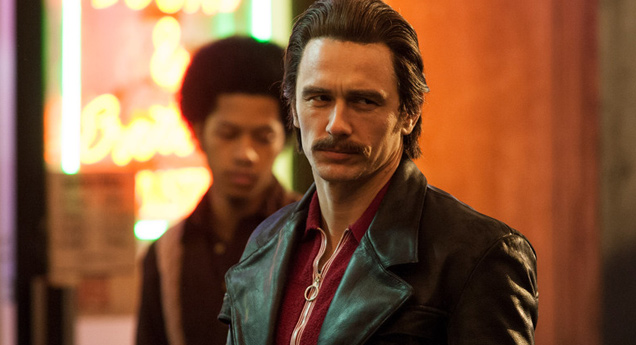David ‘The Wire’ Simon on New Pornography Drama ‘The Deuce’

Journalist-turned-TV producer/writer David Simon is a legend thanks to his seminal five-season drama The Wire. He’s been very busy since that show ended with the likes of Generation Kill, Treme and Show Me A Hero, but his new series The Deuce, with its multi-pronged look at prostitution, pornography and crime in 1971 New York, feels like the closest thing he’s done to a spiritual follow-up to The Wire, and critics are heralding it as his best work since then.
With a heavyweight cast headed by James Franco (as twins) and Maggie Gyllenhaal, The Deuce chronicles various contributing factors to the hardcore pornography explosion that came out of New York in the early 1970s.
As is to be expected from Simon, who co-created the series with novelist/TV writer George Pelecanos, there’s a strong sense of social and economic empathy threaded throughout The Deuce, which is titled for the nickname given to 42nd Street back when the Times Square area was a dangerous place to be, and didn’t yet have an M&Ms store.
Flicks got the chance to speak to Simon in Los Angeles ahead of the premiere of The Deuce, streaming on NEON from September 11.
FLICKS: What sparked the idea to explore this time and place?
DAVID SIMON: We backed into this thing. George Pelecanos and I were working on Treme and the assistant locations manager came to us and he kept saying “I got this guy, he used to be a mob front when the sex industry got to be big in New York and he did all this stuff and he was involved in this and that and he knew all these people”. And George and I were both like, “Uh, I don’t wanna do a porn show”. It’s like a one-way ticket to gratuity. And so we sort of held him off, and he just kept insisting and finally, he said: “Look, the next time you’re in New York, just meet with the guy.” And so we did and three hours into the meeting, George and I left, pretending to go smoke a cigarette, and neither one of us smoked, and we walked around Tribeca saying “We gotta do this show”. We were writing stories down on napkins. The characters, the tragedy, the comedy, the sudden weird sense of being that these people were all sort of economic and cultural pioneers of something that was for better or for worse – in many ways for worse – but nonetheless it was coming. It was a wave. And they were at the beginning of it. And so we left that day thinking “Thank God we took the meeting,” because we were really reluctant.

This guy was the inspiration for the (primary) James Franco character, Vincent?
I can’t tell you his real name. He lived until just before we started shooting the pilot. We had mostly cast [the show], the director was picked, he read the first three scripts, but he was dying of cancer. Marc Johnson, the locations manager who’d been trying to develop it, he had been talking to him for years, he had all the stories on tape.
Was the real Vincent nostalgic about this era?
He was, in a weird way. It was a very strangely-coloured nostalgia because he’d be telling these stories and some of them would be heartbreakingly tragic and some of them would be hilariously funny, and some of them both at the same instant. But the stories were so good and so, George and I would be looking at each other across the table going “Oh man I wanna write that one up.”
Was there a temptation to portray this time in New York’s history in a nostalgic manner?
For me, I’m really interested in what happened at this moment. You gotta remember, it’s an extraordinary moment. The New York courts began to interpret obscenity laws very liberally, they got tired of trying to explain what was obscene and what was not. It’s a very complicated thing. Eventually, they gave up, and there was a window where they threw it up to the idea of community standards, the community will decide. And New York decided, New York said: “We don’t care.” There is no product, then suddenly there’s a product. And the product is human sexuality, the commodification of women, specifically. The legal system’s checking out, it’s now up to your economic structures to figure out what we’re gonna sell and how. And that’s an incredible moment – if ever you wanted to have almost a perfect parable of what the market will bear and what market capitalism is, and where labour stands.

To pick up on your earlier comment, how do you avoid being gratuitous when portraying pornography and prostitution?
You try not to be gratuitous is the answer. There are two dangers here – one is that you’re coy about what the product is, and you sort of allude and you’re not being blunt about what’s being sold and the cost of that and how human beings relate to what’s actually being sold because you don’t show it. And at that point, you look up one day and you’ve made Pretty Woman and it’s all just light fare to talk about sexual commodification and misogyny. Or you go the other way which is the camera’s lingering too long, and pretty soon you find yourself making porn to critique porn. You’re trying to land on a fence and you’re trying to stay on that fence.
Did you have any direct experience of the New York you are portraying?
I worked a summer in New York when I was 17 [1977]. And I remember thinking how astonishingly debauched and dangerous the city was. It was amazing to me. I would go into the city and tool around. For a city now that is so freaking safe, and I’m not being nostalgic here, but there was something astonishing about New York in that period, before all the money landed, when it was just coming to terms with a lot of things, and failing to come to terms with a lot of things. I remember trying to buy some marijuana in Tompkins Square, and I bought oregano or something, but it only cost me twenty dollars and I got out with my life. I remember thinking: “I’m okay, I’m gonna go smoke this oregano because nobody killed me. I got that going for me”.
The Deuce screens Monday nights on SoHo and will be available to stream on NEON. This lovely piece of content is brought to you by NEON. If you’re not on NZ’s best streaming service already, click here to start a 30 day trial.


















